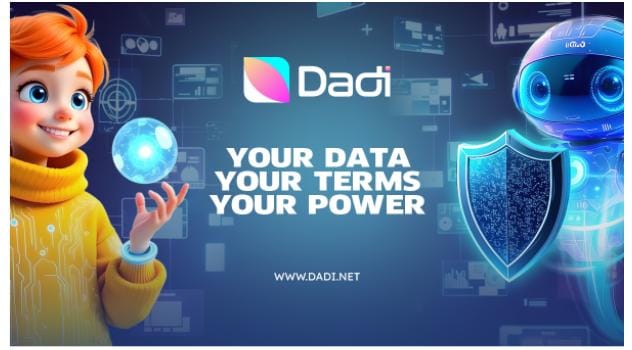
In the early 20th century, oil redefined the global economy. It powered industries, shaped international power dynamics, and became the foundational asset of modern development.
A century later, many argue that data has taken its place.
Unlike oil, however, data is not extracted from the ground — it's generated by individuals every time they use a device, open an app, or interact online. It’s also not in short supply. From search history to scroll behavior, personal data now drives the algorithms that power everything from advertising to AI.
And yet, while vast economic value is created from this constant digital output, the individuals producing it rarely — if ever — see any return.
That imbalance is something the team behind DADI aims to address.
DADI (short for Data and Digital Intelligence) is a platform designed to restructure how data is shared, protected, and valued. Rather than allow tech companies to quietly extract personal information, DADI introduces a model where users can voluntarily share selected data in return for measurable benefits.
“People have become the invisible workforce of the internet,” says Oliver Thompson, Chief Brand Officer at DADI. “Our habits, preferences, and behaviors are monetized daily — often without our knowledge or consent.”
Through its system of Encrypted Data Assets (EDAs), DADI allows users to convert their data into secure, anonymized assets that can be used by vetted research institutions and businesses to generate insights — without exposing the individual’s identity or raw data.
Every data transaction within the DADI ecosystem is logged and visible to the user. Access is always permission-based, and no data is shared without explicit consent. There are no hidden clauses or background tracking.
According to Thompson, this focus on transparency is fundamental. “We believe people should be able to benefit from their data — without giving up their privacy. Trust is something that needs to be earned, especially in this space.”
The approach contrasts with that of many mainstream platforms, where data collection is often opaque and user control minimal. DADI’s model emphasizes user autonomy and privacy by design, rather than offering privacy as an afterthought.
While data privacy is a central feature, DADI’s broader ambition lies in enabling a more balanced digital economy — one where individuals are stakeholders, not just data points.
By treating personal data as a usable asset, DADI introduces the potential for individuals to contribute to research and innovation in meaningful ways, while also receiving value in return. Approved partners can access aggregated insights for everything from healthcare research to product development, provided users grant access.
The system is structured to enable value to flow both ways: businesses gain relevant insights, while users retain ownership and oversight.
With global conversations around AI, surveillance, and consent gaining momentum, platforms like DADI are entering at a time of heightened awareness.
“There’s a shift happening,” Thompson says. “In the next decade, owning and managing your data may become as important as managing your finances. We’re building the infrastructure for that future — where participation is optional, but empowerment is standard.”
While the platform is still in early rollout stages, its long-term roadmap includes broader adoption by data buyers, integrations with enterprise tools, and continued refinement of its privacy technology.
The comparison between oil and data is more than metaphor. Both are raw materials that require refining, both power modern economies, and both are surrounded by ethical and political debate.
But one key difference stands out: data is regenerative. It is created constantly, endlessly — and, unlike oil, its value increases the more it is contextualized and combined.
If platforms like DADI succeed, they could help redefine not only how data is handled, but who benefits from it.
And that might signal a new kind of digital economy — one built not on extraction, but on inclusion.
Media Contact:
Contact person: Leslie James
Company name: DaDi ANALYTICS LTD
Email: Leslie.james@dadi.net
Address: C957+HRR, Road Town, British Virgin Islands
Website: https://dadi.net
Media Contact
Company Name: DaDi ANALYTICS LTD
Contact Person: Leslie James
Email: Send Email
City: C957+HRR, Road Town
State: British Virgin Islands
Country: United Kingdom
Website: https://dadi.net
